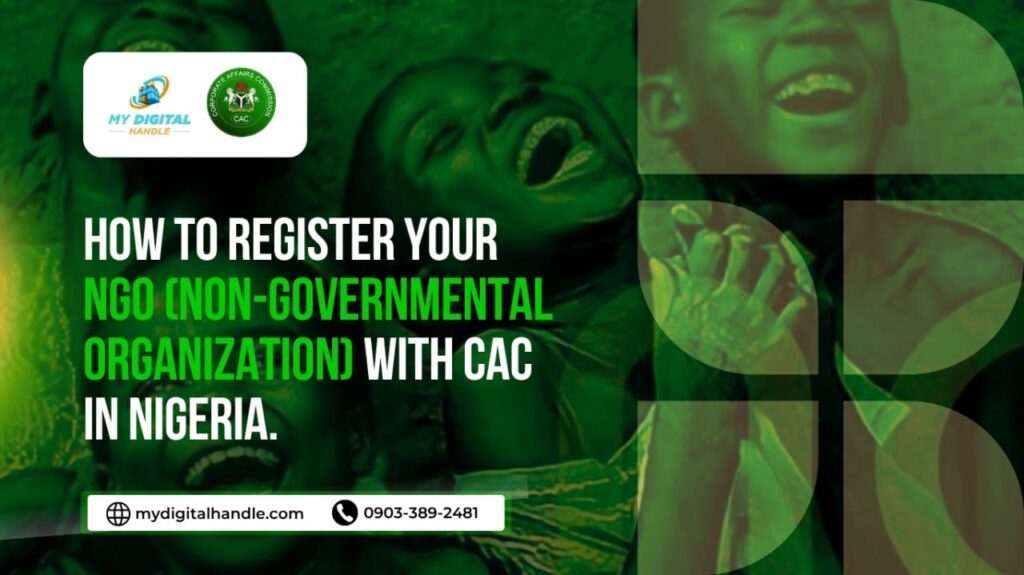
Starting an NGO (Non-Governmental Organization) is a powerful way to create social impact, promote change, and support communities. But to operate legally in Nigeria, your NGO must be registered with the Corporate Affairs Commission (CAC).
Registering your NGO shows the government, donors, and the public that you are serious and legitimate. It gives your organization a formal identity and opens the door to grants, partnerships, and credibility.
If you’re wondering how to get started, this step-by-step guide will walk you through the process.
Why You Need to Register Your NGO
Before we jump into the process, let’s answer a simple question:
Why should you register your NGO?
Here are five important reasons:
- It’s the Law: If you’re operating any form of organized group that receives donations or carries out public service, CAC requires you to register.
- Trust & Credibility: Donors, sponsors, and international partners want to work with registered NGOs.
- Access to Grants & Support: You can’t apply for many local or international grants without being registered.
- Bank Account Opening: You can’t open a corporate bank account in your NGO’s name without CAC documents.
- Legal Protection: A registered NGO is a legal entity, separate from its founders. This protects the personal assets of the trustees.
Step-by-Step: How to Register Your NGO with CAC

Registering an NGO is not the same as registering a business name or company. It’s more detailed and follows the rules for Incorporated Trustees under Part F of the CAMA Act.
Here’s what you need to do:
Step 1: Choose Your NGO Name
Pick a unique name for your NGO. This name must not be too similar to any existing registered organization in Nigeria.
Tips:
- Make sure the name reflects your mission or cause.
- Have 2–3 alternative names in case your first choice is taken.
At MyDigitalHandle, we’ll help you check name availability and ensure it complies with CAC rules.
Step 2: Get Trustees for the NGO
You’ll need at least two trustees for your NGO. Trustees are like the board members—they help manage the organization.
Requirements for Trustees:
- Must be adults (18+ years).
- Must not be bankrupt or convicted of a crime.
- Must give consent to serve.
You’ll need the following details for each trustee:
- Full name
- Passport photo
- Government-issued ID (e.g., NIN, voter’s card, passport, or driver’s license)
- Occupation, email address, phone number, and home address
Step 3: Draft Your NGO Constitution
This is your organization’s official rulebook. It outlines:
- Your mission and objectives
- How trustees are appointed or removed
- How meetings are held
- What happens if the NGO is closed
At MyDigitalHandle, we help you draft a solid constitution that meets CAC standards.
Step 4: Publish Newspaper Notice
CAC requires a public notice to be published in two national newspapers. This is to notify the public about your intention to register an NGO.
The notice includes:
- Your NGO name
- Purpose of the organization
- Names of trustees
- Location of the office
This is a mandatory legal step and we handle it for you as part of our service.
Step 5: Fill and Submit the Registration Forms
You’ll need to submit several forms to CAC, including:
- Application for Registration (Form CAC/IT 1)
- Details of Trustees
- Minutes of the meeting where the trustees were appointed
- Minutes of meeting approving the constitution
- Passport photographs and valid IDs of trustees
All of these must be correctly filled and submitted. Any mistake can delay your registration.
Step 6: Pay CAC Fees
The CAC fee for NGO registration includes processing, filing, and newspaper publication.
At MyDigitalHandle, we handle everything — start to finish — for a flat fee of ₦150,000. This includes:
- Name search
- Trustees documents
- Drafting of constitution
- Two newspaper publications
- CAC filing and follow-up
- Certificate of incorporation
- MEMART (Memorandum & Articles of Association)
Step 7: Get Your CAC Documents
Once CAC approves your application, you’ll receive:
- Certificate of Incorporation (proves your NGO is registered)
- MEMART (rules and structure of your NGO)
- TIN (Tax Identification Number) certificate
You’ll get soft copies via email and can print hard copies if you wish.
These documents are essential when:
- Opening a bank account
- Applying for grants
- Partnering with government or NGOs
- Hosting events or fundraising
Why Choose MyDigitalHandle?
We’ve helped hundreds of Nigerians register their NGOs without stress.
Here’s why clients choose us:
- Fast turnaround — We move quickly and handle delays for you.
- Expert help — We know the CAC system and help you avoid costly mistakes.
- Affordable pricing — All-inclusive NGO registration for just ₦150,000.
- Customer support — We keep you updated every step of the way.
You don’t need to worry about long queues or CAC portal stress — we handle everything for you.
Frequently Asked Questions (FAQs)
1. Can I register my NGO alone?
Yes, but you’ll still need at least one other person as a trustee. CAC requires two or more trustees.
2. How long does the registration take?
On average, 4–6 weeks. It can be quicker if all your documents are ready and correctly submitted.
3. Do I need a lawyer to register my NGO?
Not necessarily. But it’s safer to work with professionals who understand the CAC system. We’re here to help.
4. Can I operate without registering my NGO?
You can start informal activities, but without CAC registration, you can’t open a bank account or receive major donations.
5. Can I register an NGO from outside Nigeria?
Yes. As long as you have Nigerian trustees and a registered Nigerian address, you can register from abroad.
Ready to Register Your NGO?
At MyDigitalHandle, we make NGO registration simple, affordable, and fast. Our flat fee of ₦150,000 covers everything you need — from name check, newspaper publication to final certificate.
Don’t let paperwork, CAC delays, or confusion stop your vision.
Let’s help you register your NGO the right way.
Contact us today to get started!

